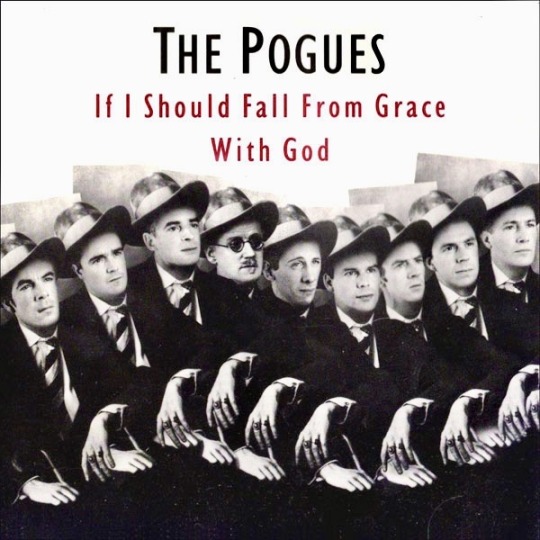#philip chevron
Explore tagged Tumblr posts
Text




Select Magazine February 1992/the Pogues with Joe Strummer
if you like my scans and want to help out you can do so here I'm currently trying to raise around $100 to buy a better scanner any help is appreciated!
#the pogues#joe strummer#jem finer#spider stacy#James Fearnley#Terry Woods#Philip Chevron#Darryl Hunt#Andrew Ranken#select magazine#90s#magazine scans#my scans#my scanner glitched sorry but it should still be readable#i just can't stand to go and re-rescan that page it's already a very time consuming and tedious process
14 notes
·
View notes
Text




Aidan's video contribution to an event celebrating Philip Chevron that took place on June 24.
x
45 notes
·
View notes
Text
youtube
The Pogues - Summer in Siam
#the pogues#summer in siam#shane macgowan#jem finer#spider stacy#philip chevron#terry woods#andrew ranken#james fearnley#darryl hunt#folk punk#irish folk#folk music#pop#hell's ditch#1990#Youtube
9 notes
·
View notes
Text
Happy birthday Philip Chevron
0 notes
Text
Philip Chevron new music
The late legendary Philip Chevron of The Radiators from Space and The Pogues wrote a collection of songs for a musical, The Turner. The Turner is the tale of Irish-American boxer Jack Rooney. Contributors to the album included Kirsty MacColl, Dubliners legend Ronnie Drew, and fellow Pogues Andrew Rankin and Spider Stacy. The CD version of The Turner is limited to 250 copies and is available now…

View On WordPress
1 note
·
View note
Text
Listen To The Band: The Pogues
I call Listen To The Band one of my occasional series. The last one was in August of last year, and the one before that in September 2022, so I think I’m living up to the description. I have been meaning to do one of my tribute pieces for Shane MacGowan since he passed away at the end of November, but never quite got round to it. This is by way of my tribute, and it is an excuse to play some…
youtube
View On WordPress
#Kirsty MacColl#music#Ella Finer#Ewan MacColl#Jem Finer#Listen To The Band#Philip Chevron#Shane MacGowan#The Pogues#Youtube
0 notes
Text
Chevron Corporation approved flanges in UAE
Meraki Star Metals Oil & Gas Equipment Trading L.L.C offers a broad assortment of Monel Compound 400 Flanges, where these things that are being introduced by us are made using extraordinary metal. Monel 400 Slip on Flanges (UNS N04400) are areas of strength for a compound that should be hardened by cooling. Welding systems including gas - roundabout section welding, metal - twist welding, gas - metal - bend welding and brought down - bend welding is recommended on these Monel 400 Flanges. Significant machining gear and tooling should be used in Monel 400 Weld Neck Flanges to restrict jabber or work-setting of the blend before the cutting.
Monel 400 Outwardly impeded flanges are embodied by their insurance from attack by acids and stomach settling agents, as well as their high mechanical strength and incredible flexibility. Meanwhile, these Monel 400 Lap Joint Flanges are moreover being introduced in different sizes and shapes to our clients. A totally current compound, these Monel 400 Connection Weld Flanges, is a prevalent show mix that benefits colossally from twofold dissolving through the Electro Slag Refining (ESR) process. Electro Slag Refining (ESR) process ensures the cleanest and most prominent Monel 400 Ring Joint Sort Flanges are given.

There is no requirement for post weld heat treatment in these Monel 400 Exhibition Blind Flangess. Nonetheless, careful cleaning in the wake of welding is basic for ideal consumption obstruction in Monel 400 Nippolet Flanges, or, in all likelihood there is the gamble of pollution and embrittlement.
Monel 400 Pipe Flanges Specifications
Specifications: ASTM B564 / ASME SB564
Size: 1/2″NB TO 60″NB
Standards: ANSI/ASME B16.5, B 16.47 Series A & B, B16.48, BS4504, BS 10, EN-1092, DIN, etc.
Class / Pressure: 150#, 300#, 600#, 900#, 1500#, 2500#, PN6, PN10, PN16, PN25, PN40, PN64 etc.
Standard: ANSI Flanges, ASME Flanges, BS Flanges, DIN Flanges, EN Flanges, etc.
#Monel 400 Flanges Manufacturers in UAE#Monel 400 Flanges Suppliers in UAE#Monel 400 Flanges Stockists in UAE#Monel 400 Flanges Exporters in UAE#Chevron Corporation Approved Flanges In UAE#Colonial Pipelin UAEe Approved Flanges In UAE#Conoco Philips Approved Flanges In UAE
0 notes
Text
a complete boycott list in alphabetical order
a complete list of companies / brands / franchises to boycott in support of palestine that i have been working on putting together for a while now.
remember to support your local businesses
stand with palestine against genocide
(Food & Beverages)
A
Activia
Acqua Panna
Akmina
Absolute Vodka
Algida
A&W
Aquafina
Alpro
Actimel
B
Burger King
Baskin Robbins
Ben & Jerry's
Bugles
Betty Crocker
Badoit
Becel
C
Coca Cola
Costa Coffee
Cadbury
Cheerios
Cheetos
Campbells
Calve
Cappy
Chiquita
D
Dominos
Dasani
Dunkin' Donuts
Doritos
Dr Pepper
Danone
Dolcela
Damla
Dogadan
E
Evian
Eden
F
Fanta
Frito-lay
Fruit by the Foot Roll Ups
Falim
Fresca
G
Gatorade
Greggs
H
Hardees
Haagen Dazs
Heinz Ketchup
Hershey's
Hard Rock Cafe
Heinz
I
Innocent
Israeli Fruits & Vegetables
J
Jacob's
Jaffa
K
KitKat
KFC
Kbueno
Kraft Mac & Cheese
Kellogg's
Kraft
L
Lipton
Lays
M
McDonald's
Mars
Marks & Spencers
Maggi
Marila
Monster
Mountain Dew
Mehadrin
Minute Maid
Milk Bar
M&M's
Magnum Ice Cream
Milka Chocolates
N
Nestle
Nestle Cereals
Nescafe
Nesquik
Nespresso
Nido
Nutella
Nature Valley
Nestle Milo
Nestle Carnation
Nestle Coffee Mate
Nestle Nestum
Nimbooz
Nestea
O
Orea
Original Shredded Wheat
P
Papa John's
Pepsi
Pringles
Pizza Hut
Perrier
Pillsbury
Popeyes
Pretty a Manager
Pure Life
Powerade
Popup Bagels
Q
Quality Street
Quaker
R
Redbull
Ruffles
S
Starbucks
Subway
Smartwater
Sweetgreen
Snickers
Sprite
Sabra
Sunkist
Strauss
Smarties
S.pellegrino
Schweppes
Sana
Sirma
Sara Lee
T
Toblerone
Tang
Twix
Tesco
Tropicana
U
V
Vittle
Volvic
W
Wall's
Walmart
Walkers
Wrigley's
X
Y
Z
7Up
(Clothing)
A
America Eagle
Adidas
Alo
Adina Eden Jewelry
B
C
Converse
Calvin Klein
Cat
Castro
D
Drew
Diesel
E
F
G
Good American
GAP
H
H&M
I
J
K
Kamili
L
Levi's
Lumberjack
M
Mango
N
Nike
O
Oasis
P
Puma
Q
R
River Island
S
Skims
Skinny Dip
St. Mark
Style Nadia
T
Timberland
U
V
Victoria's Secret
Vakko
W
We Wore That
Wyeth
X
Y
Z
Zara
(Beauty)
A
Aveda
Amika
Avon
Aussie
Aveeno
Always
Aesop
Ahava
B
Bobbi Brown
Blistex
Bath & Body Works
Britney Spears Fragrance
Becca
Biotherm
Beauty Blender
C
Clinique
Covergirl
Colgate
Calgon
Camay
CeraVe
Christina Aguilera Perfumes
Clean & Clear
Crest
CND
Cacharel
D
Dr. Jart+
Dove
Dettol
Darphin Paris
Dark & Lovely
E
Essie
Elidor
F
Fenty Beauty
Fair & Lovely
G
Garnier
Gillette
Glam Glow
H
Honest Beauty
Haci Sakir
Herbal Essences
Head & Shoulders
Hugo Boss
I
J
Jo Malone
Johnson & Johnsom
K
Kerastase
Kiehl's
Kylie Cosmetics
Kylie Skin
Kotex
L
L'Oreal
Lacome
La Roche-Posey
Lifebuoy
Lux
Lubiderm
M
Maybelline
MAC
Moroccan Oil
Maui
Matrix
Max Factor
N
Nyx
Neutrogena
Nivea
Nature's Beauty
Niely
O
Olay
Origins
Orkid
Oral-B
Oax
P
Pepsodent
Pantene
Q
R
Revlon
Rimmel
Rexona
Rhode
S
Summer Fridays
Schick
Smashbox
Sephora
Sensodyne
Skinceuticals
Skin Better Science
T
The Body Shop
Too Faced Cosmetics
The Ordinary
Tom Ford Beauty
Tampax
Takami
U
Urban Decay
Ulta Beauty
V
Vichy
Vaseline
Veet
W
X
Y
Yes to
Yuesai
Z
(Luxury)
A
B
C
Chanel
D
E
Estee Lauder
F
G
Georgio Armani
H
I
J
K
L
LVMH
Louis Vuitton
La Mer
Lavs
Le Labo
M
Mugler
Maison Margiela
N
O
P
Prada
Q
R
Raplh Lauren
S
T
Tiffany & Co.
Tom Ford
Tommy Hilfiger
U
V
Valentino
W
X
Y
Yves Saint Laurent
Z
(Tech & Entertainment)
A
Aol
Amazon
AirBnB
Apple
B
BBC
Buxton
Barbie
Booking.com
C
CNN
D
Disney+
Dell
E
Energizer
F
Ford
Fiverr
G
Galaxy
H
HP
Hyundai
Hulu
I
IBM
Intel
J
K
L
Lego
M
Motorola
Movenpick
Mattel
Microsoft
N
National Geographic
Nokia
Netflix
O
Oracle
Oxi
P
Philips
Q
R
Rolls Royce
S
Siemens
Sodastream
T
Toys R Us
U
V
Volvo
Valvoline
W
Wix
X
Y
Z
(Other)
A
Axa
Ariel
Aero
Ambi Pur
Airwick
Aroma
AVC
Amway
Ace Hardware
Andrex
American Express
B
Bounty
Black & Decker
Bonux
Bref
Braun
Benadryl
Band-aid
Barclays
Blue Cross Blue Shield
Better Help
C
Caltex
Chevron
Culligan
Citi Bank
Chicco
Cravola
Clearblue
Capital One
D
Dash
Drynites
Dosmestos
Doona
E
Expedia
F
Finish
Febreeze
Fixodent
Fairy
G
Goop
Gerber
Gys
H
HSBC
Huggies
Hayat
I
Imodium
J
JCB
K
Kimberly-Clark
Kleenex
L
Lion
Little Swimmers
Lenor
M
Mr Muscle
Minidou
Monsanto
N
Nicorette
O
Omo
P
Pampers
Purina Felix
Payoneer
Palmolive
Protex
Pull-ups
P&G
Prima
Pril
Paramount Pictures
Q
R
Rejoice
Rinso
Rogaine
S
Signal
Sensus
Sudafed
T
Tide
U
Unilever
Us Cellular
V
Vim
Vanish
Vicks
W
X
Y
Yumus
Z
(Places)
A
B
C
D
Disney
E
F
G
H
I
J
K
L
M
N
O
P
Q
R
S
T
U
V
W
X
Y
Z
(People)
A
Ashley Tisdale
Amy Schumer
Andy Beshear
B
Bono
Ben Savage
Bella Thorne
Beyonce
C
Chris Evans
Claire Holt
Ciara
Chris Rock
Chris Pine
D
Demi Lovato
Dwayne Johnson
DJ Khaled
E
Eva Longoria
F
G
Gal Gadot
H
I
Ian Somerhalder
J
Jamie Lee Curtis
James Maslow
Justin Bieber
Jennifer Aniston
Jaclyn Hill
Jack Harlow
Jordan Peele
Joseph Quinn
Jack Black
K
Kylie Jenner
Kim Kardashian
Kris Jenner
Kerry Washington
Katie Perry
Karlie Kloss
Khloe Kardashian
Kat Graham
Kendall Jenner
Kourtney Kardashian
L
Lebron James
Lana Condor
Lana Del Rey
M
Millie Bobby Brown
Malala
Mindy Kaling
Mark Hamill
Madonna
N
NFL
Nina Dobrev
Natalie Portman
Nabela
Nicole Richie
Noah Schnapp
O
Octovia Spencer
P
Perez Hilton
Paul Wesley
Phoebe Tonkin
Pia Mia
P!nk
Q
R
Ronaldinho
Rihanna
S
Sofia Richie
Shaquir O'neal
Selena Gomez
T
Tara Strong
Taika Waititi
Taylor Swift
Tyler Perry
U
Usher
U2
V
Vanessa Hudgens
Viola Davis
W
X
Y
Z
#boycott#boycott israel#boycott mcdonalds#boycott starbucks#boycott disney#boycotting#pro palestine#fuck israel#support palestine
92 notes
·
View notes
Text
Last summer, when the Supreme Court of the United States jolted the legal system by overruling the landmark Chevron decision, John Vecchione, of the New Civil Liberties Alliance, was one of many conservative legal advocates who celebrated the ruling’s downfall in Loper Bright Enterprises v. Raimondo. As the lead lawyer in Relentless Inc. v. Department of Commerce, a companion case to Loper Bright, which upended four decades of administrative law, Vecchione has played a starring role in a number of legal battles aiming to rein in the so-called administrative state—by vesting the judiciary with greater oversight of federal agencies, regulations, and how the government goes about setting rules that touch all corners of American life. In this broader campaign, ending Chevron was worthy of a toast. “We had sparkling wine,” Vecchione told me. (There was no champagne on hand.)
The New Civil Liberties Alliance, or N.C.L.A., was founded during the early days of the first Trump Administration by a group of conservative-leaning legal advocates, to “tame the unlawful power of state and federal agencies.” Many of their cases have targeted the same kind of administrative power that President Trump himself is determined to stamp out—including his all-out assault on independent watchdogs and agencies. Philip Hamburger, a Columbia law professor who founded N.C.L.A. and serves as its C.E.O., told me in an e-mail that the group “defends our civil liberties by confining our government to lawful power, regardless of who’s in the driver seat.”
As part of that mandate, Vecchione and his team have recently directed their legal firepower at Trump, challenging one of the defining and most disruptive policies of his second Presidency: his invocation of emergency powers to impose across-the-board tariffs on imported goods, which the White House has claimed are necessary because “foreign trade and economic practices have created a national emergency.” N.C.L.A. filed suit just one day after what has now become known as “Liberation Day,” which plunged the U.S. into a trade war and wreaked havoc on financial markets around the world.
N.C.L.A.’s lawsuit, the first of its kind, was brought on behalf of Simplified, a small, woman-owned and led company, based in Florida, that relies on Chinese-made materials to sell planners, stationery, and other paper products. Notably, the case doesn’t challenge the latest round of levies imposed on Liberation Day, some of which have since been paused. (A ten-per-cent universal tariff remains in place.) Instead, the federal complaint, filed in the Northern District of Florida, seeks to invalidate a pair of executive orders Trump signed in February and March that placed tariffs on imports from China, Canada, and Mexico—the U.S.’s three largest trading partners—and which are still very much in effect. Yet the case stands to influence legal challenges to the Liberation Day tariffs, too, because the President relied on the same mechanism for both the earlier and more recent tariff announcements, declaring a national emergency under the International Emergency Economic Powers Act, of 1977. The statute, known as the I.E.E.P.A., had never before been used to enact tariffs; indeed, the word “tariff” isn’t mentioned anywhere in the statute’s text. What the law does do is allow the President to “regulate” an assortment of international economic transactions whenever the nation is faced with “an unusual and extraordinary threat.”
But, in this current moment, there’s no such threat. “Whether ‘regulate’ includes the power to impose a tariff, and the scale and scope of what tariffs might be authorized under the statute, are open questions,” the otherwise staid Congressional Research Service noted in its own analysis of Trump’s actions. N.C.L.A. puts Trump’s lack of authority in far more forceful terms. The law “does not allow a president to impose tariffs on the American people,” the organization’s complaint reads. “President Trump’s Executive Orders imposing a China tariff are, therefore, ultra vires”—beyond his authority—“and unconstitutional. This Court should enjoin their implementation and enforcement.”
There are other congressional enactments that do authorize tariffs, which Trump duly invoked during his first term without drawing a major legal challenge. N.C.L.A. points to the Trade Act of 1974, which allows the U.S. Trade Representative to “impose duties or other import restrictions,” or else to “proclaim a tariff-rate quota on the article.” When Trump relied on those and related authorities to levy tariffs on China, on steel and aluminum imports, and on washing machines and solar cells, his first Administration followed an onerous regulatory process, called for by Congress, that took the better part of a year to complete in all three instances. Not so with the China tariffs imposed in February and March, for which Trump turned to the I.E.E.P.A.
To kick that overreach into high gear, on the first day of the new Administration, the freshly inaugurated President declared a national emergency at the southern border, which he insisted was “overrun by cartels, criminal gangs, known terrorists, human traffickers, smugglers, unvetted military-age males from foreign adversaries, and illicit narcotics that harm Americans.” Few things rouse Trump more than the spectre of rampant migrant criminality and drugs hovering over the nation, and so his Administration doubled down on a manufactured sense of emergency, naming both immigration and economics as reasons for dictating trade policy under the I.E.E.P.A.—and making examples of China and our North American neighbors in the process. “President Trump is taking bold action to hold Mexico, Canada, and China accountable to their promises of halting illegal immigration and stopping poisonous fentanyl and other drugs from flowing into our country,” a White House fact sheet released in early February read. This rationale adorned the accompanying executive order targeting China: “Imposing Duties to Address the Synthetic Opioid Supply Chain in the People’s Republic of China.” And, in March, the President increased the tariffs on Chinese goods yet again, citing the absence of “adequate steps to alleviate the illicit drug crisis.” (The current tariff rate, which Trump raised again on Wednesday, in response to China’s retaliatory tariffs on U.S. imports, is a hundred and forty-five per cent.)
Because the tariffs and Trump’s many defenses of them—the need to deal with trade deficits, raising revenue, and other “purely economic” reasons, in Trump’s words—cannot be shown to be “necessary” to address this supposed emergency, as the I.E.E.P.A. requires, N.C.L.A. believes the courts can and should declare them unlawful. After all, this will go to the very Supreme Court that declared, when overruling Chevron, that courts owe no deference to the executive branch when interpreting statutes. “This Court that is so textualist and so originalist is not going to let the President use the statute for something that is just not in the statute,” Vecchione told me.
The long game here may go beyond tariffs. Nested within N.C.L.A.’s statutory argument lies a fairly straightforward constitutional argument, plus two others that are more complex—or that are at least up for debate under current Supreme Court precedent. According to Article I of the Constitution, only Congress has the “Power To lay and collect Taxes, Duties, Imposts and Excises” and “regulate Commerce with foreign Nations.” Because tariffs are, effectively, a tax on U.S. businesses that rely on foreign goods to operate, the argument goes, the President cannot wrest this power from Congress. So far so good.
But what if Congress has delegated this taxation authority to the President, as Trump claims it did in the I.E.E.P.A.? Then, N.C.L.A. contends, such delegation was so sweeping and amorphous as to rob Congress of its own legislative authority—and thus the law itself violates a legal precept known as the nondelegation doctrine. This relic of constitutional law, which the Supreme Court hasn’t taken seriously since its quiet death in the New Deal era, is more mythical than historical—holding, more or less, that Congress cannot delegate its lawmaking power to another branch of government. The last time the Supreme Court deployed the doctrine to strike down a federal enactment was in 1935, when Chief Justice Charles Evans Hughes declared unconstitutional a key part of President Franklin D. Roosevelt’s New Deal agenda. “Congress cannot delegate legislative power to the President to exercise an unfettered discretion to make whatever laws he thinks may be needed or advisable for the rehabilitation and expansion of trade or industry,” Hughes wrote.
For many years now, N.C.L.A. and others in the conservative legal movement, including a number of Trump-aligned judges, have been trying to make the nondelegation doctrine great again. The closest the current Supreme Court has come to doing so was in Gundy v. United States, a 2019 case in which N.C.L.A. filed an amicus brief urging the Supreme Court to revive it and call it something snappier: divestiture. “Statutes that divest Congress of these legislative powers by conferring them upon executive or agency officials are violating the Constitution itself—not mere judicial ‘doctrine’ or precedents,’ ” Jonathan Mitchell, a lawyer for N.C.L.A. who later rose to prominence as the architect of S.B. 8, a Texas anti-abortion statute, wrote at the time. “Using the term ‘nondelegation doctrine’ both misdescribes and understates the problem with statutes that give lawmaking powers to agency officials, and the widespread use of this nomenclature stacks the deck in favor of administrative power and against the judicial enforcement of Article I’s vesting clause.”
The Supreme Court, in a fractured ruling that couldn’t command a majority of five Justices, didn’t adopt N.C.L.A.’s proposal in Gundy. But the dissenters, led by Justice Neil Gorsuch, alluded to the group’s argument when writing that judges “have an obligation to decide whether Congress has unconstitutionally divested itself of its legislative responsibilities.” In a retort that illustrates the far-reaching consequences of reviving the nondelegation doctrine, Justice Elena Kagan, writing for a four-Justice plurality, mused that if the delegation challenged in Gundy were ruled unconstitutional, “then most of Government is unconstitutional.” In the next few months, the Justices will get a second bite at the apple: in a pending challenge to the Federal Communications Commission’s authority to provide phone-and-internet programs for underserved areas, the Supreme Court will once again tell us if the nondelegation doctrine has any life left in it at all. (In an amicus brief, N.C.L.A. has urged the Justices to question the funding mechanisms of the programs, which for decades has supplied billions to subsidize connectivity in schools, libraries, hospitals in rural areas, and low-income communities. “The ‘nondelegation’ doctrine is failing,” the group lamented.)
Another thing Gorsuch did in Gundy, presaging yet another argument N.C.L.A. advances in its tariff lawsuit, is to play up the so-called major-questions doctrine. This newer doctrine took on a life of its own during the Biden Administration, when the Supreme Court struck down a number of federal policies it deemed of vast “economic and political significance”—including the Center for Disease Control and Prevention’s pandemic-era eviction moratorium, the Environmental Protection Agency’s ability to regulate certain greenhouse-gas emissions under the Clean Air Act, and the President’s student-debt cancellation program. In this latter case, Chief Justice John Roberts, otherwise an ardent defender of executive power, mounted a forceful defense of the newfangled major-questions doctrine—which Kagan, in dissent, had accused the Court of making up out of whole cloth to strike down policies a majority of Justices didn’t like. Roberts conceded that “the major questions ‘label’ may be relatively recent,” but insisted that the doctrine is rooted in “ ‘an identifiable body of law that has developed over a series of significant cases’ spanning decades.”
Of course, which policies constitute major questions of “economic and political significance” is in the eye of the beholder, fuelling the belief that only Democratic Presidents are subject to this test. Will the current Supreme Court conclude that Trump’s tariffs also flunk it? N.C.L.A. certainly thinks so. And now that its suit is the first out of the gate, others within the group’s orbit of conservative legal activists, pro-business organizations, and allied academics appear to be gearing up for their own legal challenges. “I believe this has broken the ice,” Vecchione told me.
Following N.C.L.A.’s action, the Retail Industry Leaders Association, which represents businesses such as Best Buy, Target, and Home Depot, boosted the lawsuit through its affiliate, the Retail Litigation Center. “Before lasting damage is done to the economy and family budgets, leading retailers support timely judicial review of this abuse of authority from the White House,” the center said, in a statement. Politico, which reported on that statement, noted that multiple lawyers and associates for business groups were considering additional legal challenges to the latest round of tariffs. “All options are being considered,” one unnamed trade-association executive told the outlet. And a “prominent legal figure close to Trump” told ABC News this week that there’s “a very good chance” that the Supreme Court won’t stomach Trump’s tariffs.
On Trump’s Liberation Day, Ilya Somin, a professor at George Mason University’s Antonin Scalia Law School, published a blog post looking for suitable plaintiffs to bring a court challenge on behalf of the Liberty Justice Center, a litigation shop focussed on economic-liberty issues. (The late Scalia, I should note here, is credited with one of the better-known quips foreshadowing the major-questions doctrine: Congress, he once wrote, does not “hide elephants in mouseholes.”) Before Trump’s election, Somin had been sounding the alarm about the illegality of imposing tariffs without Congress, but the way to get this issue into court is to find plaintiffs who are harmed by the tariffs and thus have legal standing to sue. “We want to get firms that directly import from abroad,” Somin told me. As his recruitment post notes, small businesses may well be disproportionately harmed by the tariffs and thus are the perfect plaintiffs.
What strikes Vecchione about this growing legal consensus is that the business giants who stand to lose the most under a trade war have yet to put up a fight. Are they really more keen on maintaining their access to the White House, a desire that some of them made plain on Inauguration Day, than they are on protecting their bottom line? “Where is Amazon?” Vecchione asked. “Where is Walmart? Where are they? Where the heck are they?” Somin told me, “If an Apple or a Walmart wants to file a case, they may not need our help. They obviously have immense resources of their own.” Even with Trump backing down from some of the levies announced on Liberation Day, he noted, in an e-mail on Wednesday night, the importance of challenging the President’s “unconstitutional usurpation of power” remains the same. Besides, these tariffs haven’t been cancelled; they’ve just been paused. “Trump’s vacillations continue to create dangerous uncertainty,” Somin wrote.
6 notes
·
View notes
Text

The Mc Mahon Brothers Gang “Straight To Hell” by Alex Cox, with Biff Yeager, Shane MacGowan, Spider Stacy, Frank Murray, Terry Woods, James Fearnley, Andrew Ranken and Philip Chevron - The Pogues - The Clash. PunkWestern 1987 Tabernas desert, Spain . Joe Strummer cult team
#the pogues#the clash#alex cox#straight to hell#poblado tecisa#cinema#almeria#western#tabernas desert
9 notes
·
View notes
Text
youtube
Faithful Departed · Philip Chevron
2 notes
·
View notes
Text
Japan Packaging Resins Market Intelligence Report: Recession Readiness and Tariff Implications
Prophecy Market Insights Research, a leading global market research firm, has published an extensive report on the global Packaging Resins Market. This report provides a thorough examination of market trends at both global and regional levels, offering forecasts for the industry and highlighting emerging developments. It features in-depth segment analysis, insights into the competitive landscape, and key market dynamics. This study is an essential resource for gaining a comprehensive understanding of the present and future outlook of Packaging Resins Market. Base Year: 2024 Forecast Period: 2025-2035 Strategic Insights to Drive Success The report drives effective change by equipping organizations with the tools needed to identify and seize growth opportunities. With a clear understanding of market trends, it helps businesses stay ahead of the competition. Serving as a strategic resource, it enables companies to maintain a competitive edge in the Packaging Resins Market market. Its insights empower decision-makers to make informed, data-driven choices, ensuring they are positioned for success. Get a free sample of the report: https://www.prophecymarketinsights.com/market_insight/Insight/request-sample/4903 Market Insights (2025–2035) Forecasting Excellence: Leverage advanced predictive models for accurate trend forecasts. Simplified Data Visualization: Understand complex insights through user-friendly interactive tools. Sector-Specific Trends: Address industry-specific challenges and opportunities. Agility in Action: Adapt swiftly to market changes with real-time updates. Competitive Strategy Analysis: Analyze the strategies of top-performing companies. Segmentation and classification of the report: Segmentation is a strategic approach that breaks down a broad market into smaller, more manageable groups based on shared characteristics such as demographics, behaviour, needs, or preferences. This process allows businesses to customize their products, services, and marketing strategies to effectively address the unique demands of each segment. By gaining a deeper understanding of the distinct needs of various customer groups, companies can improve customer satisfaction, optimize resource allocation, and drive focused growth. Packaging Resins Market, By Type (Polystyrene (PS), Polypropylene (PP), High-Density Polyethylene (HDPE), Linear Low Density Polyethylene (LLDPE), Low-Density Polyethylene (LDPE), Polyvinyl Chloride (PVC), and Others) By Application (Food and Beverages, Restaurants, Consumer goods, Industries, Retail, Healthcare and Other) By Region (North America, Europe, Asia Pacific, Latin America, and Middle East & Africa) - Trends, Analysis and Forecast till 2030 Request for PDF Brochure of This Report: https://www.prophecymarketinsights.com/market_insight/Insight/request-pdf/4903 Top Companies in the Packaging Resins Market: The competitive landscape analysis examines the market's top players in detail, including their strategies and market positioning. It shows the strengths, weaknesses, opportunities, and threats that the industry's major corporations confront. By identifying important competitors and developing firms, this analysis assists businesses in better understanding market dynamics and benchmarking performance. Reliance Industries Ltd. Dow Chemical Company Lotte Chemical Corporation Sinopec Corporation SABIC (Saudi Arabia) Formosa Plastics Corporation Jiangsu Sanfangxiang Group Co. Ltd. ExxonMobil Corporation Toray Industries Inc. LyondellBaseall Industries Holdings B.V. M&G Chemicals Borealis AG Indorama Ventures Public Company Limited PetroChina Companies Limited. Eastman Chemical Company Arkema BASF SE Braskem S.A. Sumitomo Chemical Mitsui & Co. Plastics Ltd. Chevron Philips Chemical Co. LLC. and others. Note: The list of players mentioned above is a subset of the complete list. The report also includes regional players as part of the estimation model. For detailed competitive intelligence on domestic players across nearly 30 countries, please submit a request.
Get Flat 30% OFF on Packaging Resins Market: https://www.prophecymarketinsights.com/market_insight/Insight/request-discount/4903 Key Questions Addressed 1. What are the primary forces driving Packaging Resins Market's expansion? 2. Which firms dominate Packaging Resins Market and how do they preserve their competitiveness? 3. How do technology advancements impact the industry's future? 4. What are the primary problems and opportunities facing businesses? Key Highlights of Packaging Resins Market Research Report: In-depth analysis of the Packaging Resins Market market. Assessment of market size and growth trends. Evaluation of the competitive landscape, focusing on key players and their strategies. Insights into consumer behavior regarding Packaging Resins Market usage. Identification of emerging trends and opportunities within the Packaging Resins Market market. Regional analysis, showcasing variations in Packaging Resins Market and competitive dynamics. Industry best practices for optimizing Packaging Resins Market effectively. Market projections and future outlook to support informed decision-making. Gain a Strategic AdvantageThe Packaging Resins Market Report delivers the critical insights necessary to thrive in a competitive market. About Us: Prophecy Market Insights is a leading provider of market research services, offering insightful and actionable reports to clients across various industries. With a team of experienced analysts and researchers, Prophecy Market Insights provides accurate and reliable market intelligence, helping businesses make informed decisions and stay ahead of the competition. The company's research reports cover a wide range of topics, including industry trends, market size, growth opportunities, competitive landscape, and more. Prophecy Market Insights is committed to delivering high-quality research services that help clients achieve their strategic goals and objectives. Contact Us: Prophecy Market Insights Website- https://www.prophecymarketinsights.com US toll free: +16893053270
0 notes
Text
youtube
The Pogues - A Pair Of Brown Eyes
#the pogues#a pair of brown eyes#shane macgowan#jem finer#spider stacy#philip chevron#cait o'riordan#james fearnley#andrew ranken#folk punk#irish folk#rum sodomy & the lash#1985#Youtube
1 note
·
View note
Text
Happy birthday Philip Chevron
0 notes
Text


The Pogues - If I Should Fall from Grace with God (1988)
On this day, January 18th, 1988, If I Should Fall from Grace with God, the third studio album by the Pogues, was released. Fresh off the success of their biggest hit, “Fairytale of New York,” released roughly two months earlier, the Pogues third album became the band’s biggest hit. Reaching no. 3 on the UK Albums Chart and the top 10 in several other countries, the album also saw the arrival of three new members: Darryl Hunt, who replaced original bassist Cait O’Riordan, guitarist Philip Chevron, and multi-instrumentalist Terry Woods. With the new arrivals the band also began expanding their musical palette, incorporating styles and sounds from places like Turkey and Spain. Critically lauded, the album represents the band’s commercial high point and is viewed by many as their creative zenith and one of the best albums of the decade.
1 note
·
View note